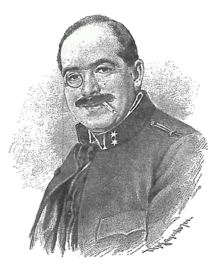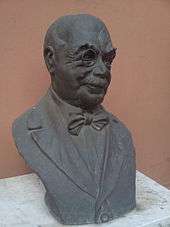Alexander Roda Roda
| Alexander Roda Roda | |
|---|---|
 | |
| Born |
Šandor Friedrich Rosenfeld April 13, 1872 Drnowitz, Moravia, Austro-Hungarian Monarchy (now Drnovice, Czech Republic) |
| Died |
August 20, 1945 (aged 73) New York City |
| Nationality | Austrian |
| Occupation | Writer |
_-_Roda_Roda_04.jpg)
Alexander Roda Roda (born Šandor Friedrich Rosenfeld; April 13, 1872 – August 20, 1945) was an Austrian writer.
Biography
Roda Roda was born as Šandor Friedrich Rosenfeld in Drnowitz, Moravia, Austro-Hungarian Monarchy (now Drnovice, Czech Republic). His sister was the physician Gisela Januszewska. As a child, he moved with his family to Slavonia. He Germanized his name from Šandor to Alexander, and his surname from Rosenfeld to Roda Roda. Roda is the Croatian word for stork. He chose his new surname because storks nested on the chimney of his house in Esseg (today Osijek). He spent more than 30 years living and working in Osijek and Slavonia.[1] In 1894, Roda Roda converted from Judaism to Catholicism.[2] In 1902, Roda Roda quit the military career and became a journalist (during World War I he was war correspondent); he contributed to the German satirical magazine Simplicissimus. In 1938, he emigrated to the US. He wrote many comedies (Der König von Crucina, 1892; Bubi, 1912, with Gustav Meyrink), tales and novels (Soldatengeschichten, 2 volumes, 1904; Der Ehegarten, 1913, Der Schnaps, der Rauchtabak und die verfluchte Liebe, 1908; Die Panduren, 1935), and autobiographical books (Irrfahrten eines Humoristen 1914–1919, 1920; Roda Rodas Roman, 1925). He died in New York City. Until his death, Roda Roda considered Esseg to be his hometown.[1]
In 1911 Roda Roda published a series of articles for the Neue Freie Presse, one of Austria's most respected newspapers. Between 1914 and 1917, he produced nearly 700 articles as war correspondent for the paper[2] as well as the German-language newspaper published in Budapest, Pester Lloyd. In the 1920s, Roda Roda's humorous and satirical book publications were largely successful. He appeared in cabarets, traveled extensively, and had contact with dozens of authors, actors, filmmakers, and other artists of his milieu.
Roda Roda was also a passionate chess player and often played in the Munich coffee house Café Stefanie. Here he found inspiration for his humorous text that discusses chess, "Das Pensionistengambit" (The Pensioners' Gambit), originally the chapter "Schach" in his 1932 collection Roda Roda und die vierzig Schurken.[3]
In 1952, Vienna's city district Floridsdorf (the 21st district) named a street, Roda-Roda-Gasse, after the author. The city of Osijek, Croatia, also boasts a bust of Roda Roda in front of the library building in Europska avenija.
Bibliography

- 1892 – Der Gutsherr von Ljublin
- 1906 – Eines Esels Kinnbacken
- 1908 – Von Bienen, Drohnen und Baronen
- 1909 – Bummler,Schummler und Rossetummler
- 1913 – 500 Schwänke
- 1925 – Roda Rodas Roman, Roda Roda erzählt
- 1927 – Donner und Doria
Filmography
- Der Feldherrnhügel, directed by Hans Otto and Erich Schönfelder (1926, based on the play Der Feldherrnhügel)
- Der Feldherrnhügel, directed by Eugen Thiele (1932, based on the play Der Feldherrnhügel)
- Der Feldherrnhügel, directed by Ernst Marischka (1953, based on the play Der Feldherrnhügel)
Screenwriter
- K. und K. Feldmarschall, directed by Karel Lamač (1930, German adaptation of a Czech screenplay)
- Er und seine Schwester, directed by Karel Lamač (1931, German adaptation of a Czech screenplay)
- Liebeskommando, directed by Géza von Bolváry (1931)
References
- 1 2 "Biografija: Alexander Roda Roda" (in Croatian). essekeri.hr. Archived from the original on March 22, 2016. Retrieved November 14, 2012.
- 1 2 Kaiser, Max: "Roda Roda (bis 1899 Rosenfeld, 1899–1906 Roda), Alexander (Sándor) Friedrich (seit 1894 zusätzl. Ladislaus) (Pseudonym Aaba Aaba, Nikolaus Suchy)", Neue Deutsche Biographie 21 (2003), pp. 687–689 (in German)
- ↑ Chapter 93, "Schach" in Roda Roda und die vierzig Schurken (1932)
External links
| Wikimedia Commons has media related to Alexander Roda Roda. |
- "Roda Roda, Alexander", list of works
- Catalogue of printed works and manuscripts, Wienbibliothek im Rathaus
- Works by Alexander Roda Roda at Open Library

- Roda Roda on IMDb